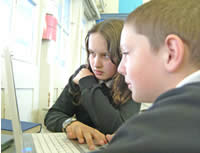Home learning: an ICT primer for students
This short-list of resources and enrichment materials for students and those working with them is aimed primarily at Key Stage 3. All the resources are free though in a few cases teachers may need to set up access first. For versions formatted for printing or to adapt, click here.
There is separate list of sites for secondary teachers here.- Achuka: Anyone interested in books and reading would enjoy visiting this attractive site.
- Assignment: Podcast: A good introduction from BT Education, including advice from BBC broadcasters, suggestions for cheap equipment and guidance on using free software.
- BBC Bitesize KS3 English: Extensive and well-used KS3 site. The resources are intended primarily for revision purposes.
- BBC Blast Writing: Inspiration and opportunities for writing, including tips by experts, discussion boards and the chance to upload your own work.
- BBC KS3 English message board: Pre-moderated discussion area for students to hold discussion about their English work.
- BBC Learning Zone Clips: Short videos selected to match the curriculum taken from BBC programmes. A growing bank of resources that's easily searched
- BBC Voices: Students interested in language would find much of this fascinating (listen out for the pet that only understands Welsh, for example). Good stimulus to making own record of spoken English
- Birmingham Grid for Learning: Student-friendly interface. See the Learners section (secondary) and the secondary and KS3 materials for lively stimuli such as Poetry Slam, Podcasting, KS3 Communicates and KS3 Imagines.
- British Library: Access to some of the unrivalled resources of one of the world's great libraries. See especially Turning the Pages and the Learning section for resources such as Texts in Context and Changing Language. The site also offers the opportunity to listen to and record voices.
- CLEO: Cumbria & Lancashire Education Online: Not comprehensive but worth exploring for resources such as those on the First World War and Norman Nicholson.
- Converse: Interesting materials such as the Chaucer and Shakespeare units and interactive resources, eg Flash-based revision.
- Dictionary.com: Online dictionary and thesaurus using a number of sources; be aware of the American usage and spelling.
- E2BN resources:
- E2BN Gallery: A useful source of images; part of the E2BN Digital Media Assets Resource Library
- Myths and Legends: This colourful site should interest KS3 students.
- Film Education: Resources on contemporary film and culture to make English studies feel relevant, including games, etc. Teachers will need to direct students to appropriate areas. Good set of media links too.
- London Gifted and Talented: Media-rich materials, particularly In Between the Lines, for students of all abilities to stimulate debate, reading and writing. Free but teachers need to register first to allow student use.
- PoemHunter.Com: As well as lots of poems this site encourages users to contribute their own writing to the website.
- Poetry Archive: A wonderful collection of recordings, with a dedicated area for students and links to other poetry sites.
- Poetry Class: An interesting site which has useful links and materials for students as well as teachers.
- Poetry Zone: Lively site that might appeal particularly to younger students maintained by a real enthusiast.
- Project Gutenberg: A comprehensive source of out-of-copyright literature. Files are offered in a variety of formats; plain text is the most useful.
- Publishing House Me: Students can submit their own writing, pictures, opinion pieces and reviews to be published online.
- Royal Shakespeare Company: High quality resources to which it might be worth directing some students, including clips of key speeches, actors explaining how they interpret lines and directors' views as well as students and teachers explaining why reading Shakespeare behind a desk is such a bad idea.
- Spark Notes: American site with summaries and commentaries on a good range of literary texts and some modern versions of Shakespeare.
- Stagework: Resources on key productions at the National Theatre and selected regional partners, including lesson materials, video clips of actors discussing their roles, workshop ideas and much more. Some materials have a wider application - for example on persuasive writing.
- Universal Teacher: A wide range of materials for KS3 and above, with tutorials on texts which are often addressed to students.
The complete lists ready to print or adapt
Ready to print versions:
- Start here: the teachers' list as an Acrobat (PDF) file

- Home learning: our list for students as a PDF file

- Start here: the teachers' list
- Home learning: our list for students
